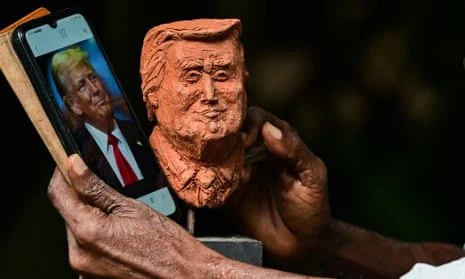
Trump’s Bold Market Move Sparks Scrutiny Over Timing And Insider Trading Accusations
In a dramatic twist that sent waves through the global financial system, President Donald Trump’s well-timed social media post urging Americans “THIS IS A GREAT TIME TO BUY!!!” just hours before announcing a surprise 90-day pause on most tariffs has triggered a political firestorm and sparked allegations of market manipulation and insider trading.

On Wednesday morning, as investor anxiety simmered amid ongoing tariff threats, President Trump took to Truth Social to calm nerves. “BE COOL,” he wrote — then minutes later, the famous line: “THIS IS A GREAT TIME TO BUY!!!” Clarity came hours afterward when news broke that Trump had decided to pause sweeping new tariff hikes, a move that triggered one of the sharpest one-day market rallies since the 2008 financial crisis.
U.S. equities rocketed higher, with the S&P 500 gaining over 9.5%, recouping roughly $4 trillion of recent losses, while the Nasdaq surged more than 12%. The rally was far-reaching, with Japan’s Nikkei 225 jumping by 9% and London’s FTSE 100 up as much as 4%, highlighting the global impact of Washington’s trade decisions.
But jubilance in markets was quickly shadowed by controversy. Lawmakers and ethics experts questioned whether Trump’s timing — and his uncharacteristic social media sign-off using initials “DJT,” which also correspond to Trump Media & Technology Group’s stock ticker — amounted to a wink to his supporters or even to savvy traders privy to sensitive information.
Representative Mike Levin of California bluntly asked, “How is this not market manipulation?” while Senator Adam Schiff called for a formal investigation, warning about “dangerous opportunities for insider trading.” Senator Chris Murphy echoed concerns that an “insider trading scandal is brewing,” questioning who inside the administration benefited financially.
Adding fuel, Congresswoman Alexandria Ocasio-Cortez urged all legislators to disclose recent stock purchases amid rumors some seized trading opportunities based on the President’s moves. “Disclosure deadline is May 15. We’re about to learn a few things,” she noted pointedly, renewing calls to ban Congressional insider trading entirely.
Amid mounting inquiries about whether Trump had already settled on his tariff pause at the time of his post, the President’s response was ambiguous. “I would say this morning. Over the last few days, I’ve been thinking about it,” he said, without providing a definitive timeline. His spokesperson defended the posts as an obligation to “reassure the markets and Americans” amidst economic uncertainty, dismissing allegations of improper conduct.
Despite the ambiguity, the market impact was undeniable. Shares of Trump’s own company, Trump Media, rocketed by 22%, doubling the broader rally — an impressive spike considering its recent financial struggles — and adding $415 million to Trump’s personal stake. Meanwhile, Elon Musk’s Tesla, buoyed by recent praise from Trump, soared too, boosting Musk’s fortune by $20 billion in a single day.
Critics argue such posts blur lines between presidential communication and financial advice, creating volatility that benefits insiders. Legal experts like Richard Painter and Kathleen Clark warned that while previous administrations might have faced investigations, Trump appears comfortable flexing market influence “with impunity.”
Across Wall Street and Washington, both wonder: were these mere reassurances in jittery times or carefully orchestrated signals benefiting a select few? As watchdog groups and lawmakers intensify calls for probes, Trump’s tariff U-turn and well-timed rally continue to fuel debate over transparency, ethics, and the integrity of U.S. markets.
The long-term consequences remain uncertain, but one thing is clear—the intersection of presidential power, policy shifts, and financial markets has rarely been so dramatic or so closely scrutinized. What do you think? Was this savvy economic messaging, or something more questionable? Share your thoughts below.